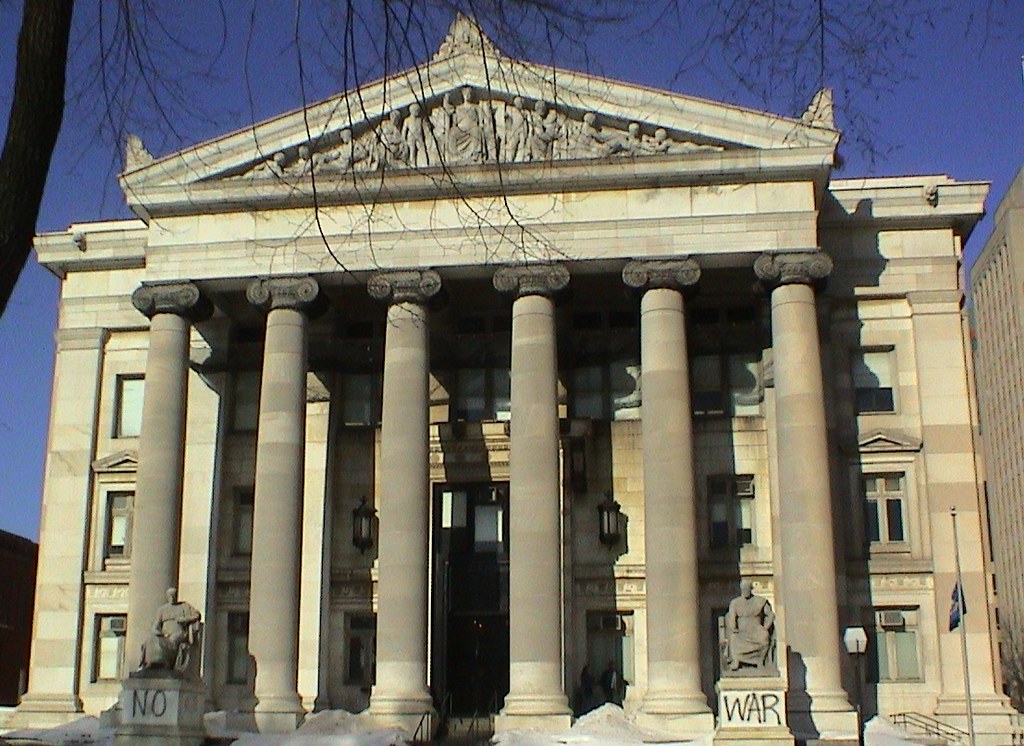And now war.

NO WAR graffiti. A different war, a different country, a different decade. But the message still holds. New Haven courthouse, CT, USA, 20th February 2003.
I felt despondent for the first day. I am a pacifist. But that does not mean a country can be attacked and militarily dominated by another and can offer no resistance. Pacifism is the opposite to might is right. It seemed that no other country would assist Ukraine militarily, which was what it needed, and it seemed inevitable that it would quickly be conquered by Russia's overwhelming military superiority. Economic sanctions hadn't yet been put in place and I was not optimistic anyway that they would have much impact on Putin, the oligarchs or the other wealthy Russians who hold the power in that country, but who keep their money elsewhere, including in off-shore havens and cryptocurrency. On the first day I feared that Russia would get away with it, that there would be civilian casualties and bombed cities in Ukraine, traumatised refugees fleeing to unwelcoming European neighbours, but merely handwringing and minimal economic wrist-slapping of Russia from the international community.
By day two I began to hope. The mere fact that Putin and his vast military had not immediately won within 24 hours, had not even conquered any Ukrainian city, was a huge failure for them. That first day and night, weakened, almost destroyed, the myth of unassailable Russian army power. Individual Ukrainians were standing in front of tanks, and making fun of Russian military vehicles broken down on the roads through rural and suburban Ukraine, while their President Zelensky was leading with courage and fearlessness, refusing to leave, becoming a hero to Ukrainians and people around the world. Zelensky is a former comedian, who less than 10 years ago became popular in a TV show about a high-school teacher who fights corrupt politicans and accidentally becomes President. He was democratically elected President with 70% of the vote. And he is Jewish, which is significant in a country with such a long history of anti-semitism, and which also puts the lie to Putin's superficially bizarre (but carefully calculated) justification for the invasion, when he claimed that he was coming to "denazify" Ukraine. Instead Putin and the Russian leadership have been inescapably exposed as the neo-fascists, the anti-democratic nationalist and imperialist forces who try to undermine democratic processes at home and abroad. Many people already knew this about Russia's economic and political leaders, of course, but this war has made it impossible to pretend anymore for those who have denied and been complicit in Russia's long-running assaults on democracy. Ukraine is a liberal democracy, of which Zelensky is one embodiment, and Russia is a kleptocratic fascist oligarchy, which Putin exemplifies.
I became more hopeful in the days since, as real and potentially significant economic sanctions were put in place. Ukraine's European neighbours welcomed the nearly 500,000 people who have so far fled. Countries began to send military assistance. The EU made the unprecedented decision to purchase weapons for Ukraine, the first time ever in the Union's history it has provided military assistance to a state. And to the tune of almost half a billion euro. To me that is the EU effectively joining a war against Russia, but perhaps this military move will be treated as something else in the strange world of international relations.
Significant moves were made to reduce Europe's dependence on Russian oil and gas, such as Germany halting a major pipeline, and fossil fuel companies divesting their shareholdings in Russian energy companies. This is happening today, on the day the IPCC releases its latest report on the devastating impacts of the climate emergency, which is also a damning indictment of the failure of world leadership to respond in anything like the way that is needed to avoid catastrophe. The uniquely comprehensive report, prepared by thousands of international authors who have reviewed all published literature on climate, makes even clearer that the impacts happening now and to come are even worse than previously recognised, with every region of the globe affected by rising temperatures and extreme weather, and around half the world's population living in places that are "highly vulnerable" to climate change. Again, those who have done least to contribute to climate change, who have lived with the lowest emissions, are the ones who are already suffering and will suffer the most. Another reason why stopping climate catastrophe needs to be a global democratic process of climate justice. We know that the world needs to come together to act radically and immediately to address climate change and reduce the horrific impacts of climate breakdown, particularly on the poorest and most vulnerable people, as well as the natural world and the planet as a whole. Some of those who don't recognise this truth are instead watching the value of their oil and gas skyrocket as they wage war against a democratic neighbour. Every conflict is a climate conflict. I am sad for the high price the Ukrainian people are paying in this war. Yet I am strangely hopeful tonight that in this violent assault on democracy by a climate destroyer, we as a world are woken to what is at stake, and that it forces us to fight in every way for the better world we want - the peaceful, democratic, climate secure world we can still achieve, together.
0 Comments:
Post a Comment
<< Home